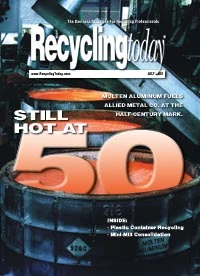WHAT GOES AROUND COMES AROUND
The distribution centers of many companies switched from plastic loose fill packaging, or "peanuts," to crumpled paper, starch loose fill or air bags because these items were perceived as environmentally friendlier alternatives. According to the Plastic Loose Fill Council, which was founded in 1991 to develop, promote and implement the original use and subsequent recovery, reuse and recycling of polystyrene loose fill, the trend is reversing.
"Today more and more companies are coming back to loose fill," John Mellott, council president, says. "Plastic loose fill is a simple, basic product that delivers. It offers fast pack speeds, superior protection, less in-transit damage and fewer returned items – all at a very competitive price."
The peanuts’ resurgence resulted from the Plastic Loose Fill Council addressing concerns about the peanuts’ lack of recycled content and non-degradability.
In 1990 the plastic loose fill industry began recycling polystyrene foam packaging into loose fill. According to the council, all plastic loose fill has recycled content ranging from 25 percent to 100 percent.
The council also created a manufacturer-sponsored take-back program, the Peanut Hotline, in 1991. The Peanut Hotline, (800) 828-2214 or www.loosefillpackacing.com on the Web, provides information on nearby loose fill recycling locations.
PET PRODUCTION PLANT EXPANDING
DAK Americas, Charleston, S.C., a subsidiary of Grupo Alfa, is expanding production capacity at its PET production facility in Moncks Corner, S.C. The estimated $100 million project is expected to be completed in the late first or early second quarter of 2003.
New equipment being installed will produce 330 million pounds per year of PET, thus doubling DAK’s current North American PET capacity. DAK acquired the South Carolina plant from DuPont in August of 2001.
Sponsored Content
Labor that Works
With 25 years of experience, Leadpoint delivers cost-effective workforce solutions tailored to your needs. We handle the recruiting, hiring, training, and onboarding to deliver stable, productive, and safety-focused teams. Our commitment to safety and quality ensures peace of mind with a reliable workforce that helps you achieve your goals.
Sponsored Content
Labor that Works
With 25 years of experience, Leadpoint delivers cost-effective workforce solutions tailored to your needs. We handle the recruiting, hiring, training, and onboarding to deliver stable, productive, and safety-focused teams. Our commitment to safety and quality ensures peace of mind with a reliable workforce that helps you achieve your goals.
Sponsored Content
Labor that Works
With 25 years of experience, Leadpoint delivers cost-effective workforce solutions tailored to your needs. We handle the recruiting, hiring, training, and onboarding to deliver stable, productive, and safety-focused teams. Our commitment to safety and quality ensures peace of mind with a reliable workforce that helps you achieve your goals.
Sponsored Content
Labor that Works
With 25 years of experience, Leadpoint delivers cost-effective workforce solutions tailored to your needs. We handle the recruiting, hiring, training, and onboarding to deliver stable, productive, and safety-focused teams. Our commitment to safety and quality ensures peace of mind with a reliable workforce that helps you achieve your goals.
Sponsored Content
Labor that Works
With 25 years of experience, Leadpoint delivers cost-effective workforce solutions tailored to your needs. We handle the recruiting, hiring, training, and onboarding to deliver stable, productive, and safety-focused teams. Our commitment to safety and quality ensures peace of mind with a reliable workforce that helps you achieve your goals.
Sponsored Content
Labor that Works
With 25 years of experience, Leadpoint delivers cost-effective workforce solutions tailored to your needs. We handle the recruiting, hiring, training, and onboarding to deliver stable, productive, and safety-focused teams. Our commitment to safety and quality ensures peace of mind with a reliable workforce that helps you achieve your goals.
Some of the PET resins being produced will be secondary resins made from scrap plastic, according to DAK spokesperson Karen Cutler.
In addition to the South Carolina plant, DAK Americas has an additional high-volume PET production facility in Fayetteville, N.C.
Get curated news on YOUR industry.
Enter your email to receive our newsletters.

Explore the July 2002 Issue
Check out more from this issue and find your next story to read.
Latest from Recycling Today
- Green Cubes unveils forklift battery line
- Rebar association points to trade turmoil
- LumiCup offers single-use plastic alternative
- European project yields recycled-content ABS
- ICM to host colocated events in Shanghai
- Astera runs into NIMBY concerns in Colorado
- ReMA opposes European efforts seeking export restrictions for recyclables
- Fresh Perspective: Raj Bagaria






